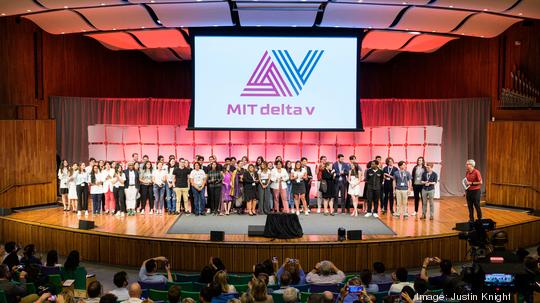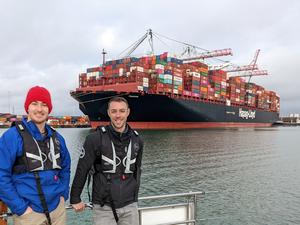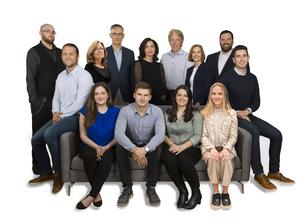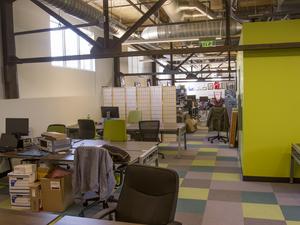
Dozens of startups have completed the delta v accelerator since its inception. Not to be outdone, this year’s cohort had some impressive ideas, pilots and surprises up its sleeve.
Delta v is run by the Martin Trust Center for MIT Entrepreneurship and serves as a capstone entrepreneurial program for MIT students. This year’s cohort of 22 startups was the 10th group to participate in the delta v accelerator since its founding in 2012.
The cohort’s teams spent this summer learning from mentors at MIT and beyond, building strong boards, forging new partnerships, and sustaining themselves on the cups of ramen noodles available 24/7 at the Martin Trust Center. Last Friday, the teams came to show off their work at the annual Demo Day event.
In honor of the 10th anniversary of delta v, here are 10 takeaways from this year’s Demo Day:
Bill Aulet, managing director of the Martin Trust Center for MIT Entrepreneurship, can jump.
He kicked off the delta v Demo Day with a display of athleticism — running through the audience for high fives and leaping up onto the Kresge Auditorium’s stage.
Once things settled down, Aulet went on to say that the strength of MIT and delta v comes from not just from the acquisition of knowledge, but from applying it to solve real-world problems. Look no further than the MIT seal, Aulet said, which features a steelworker and a philosopher side by side. He said this cohort perfectly embodies this value.
The companies who complete MIT’s delta v program have some serious longevity.
A new survey of the program’s cohorts from 2012 to 2021 found that 61% of delta v projects have gone on to become companies that either continue to exist or have been acquired. When looking at just the last five years, that percentage jumps to 69%. Fittingly, 63% of projects have become companies that raised funds.
The award for most creative video has to go to Our Kaia.
Each startup’s pitch began with a quick introductory video. The award for most creative has to go to Our Kaia, whose video featured red period cramp monsters chasing down and tackling a group of runners who tried, unsuccessfully, to ward them off with heat pads and pain killers. You can check out more of their creative content on TikTok.
“It is the 21st century. I mean, we’ve even put people on the moon. And yet 1.8 billion people have to battle the period cramp monster every single month,” said co-founder Dinuri Rupasinghe. Our Kaia is using natural ingredients like ashwagandha, boswellia and white willow bark to create a roll-on, topical product to ease period cramps. Rupasinghe said they tested their product over the summer with 40 people. She said 88% reported a decrease in painkiller usage and a reduction in period discomfort.
For the first time, at least 50% of this year’s delta v cohort was made up of women.
The accelerator said that 55% of team members in this cohort were women and 45% were men. Several startups targeted women as their main customers, such as DaVinci Wearables, which is making underwear with embedded sensors so female athletes can collect and understand data on how their monthly period cycle impacts their performance.
Moshion has been on the move this summer.
The startup is developing technology to prevent pressure ulcers for seniors, paralyzed individuals and others with mobility impairments. Earlier this year, BostInno spoke with Moshion about its plans for growth, including the development of a fabric-like material with embedded sensors that tracks pressure build up and a system for notifying health care providers. Since then, the startup has partnered with Nvidia to build its machine learning models and partnered with care institutions to collect early data using its technology.
Health and medical technology were common themes among quite a few startups at delta v, especially in areas where the health care system falls short.
Take a look at Dapken, whose tech provides automated patient education. Or Oasis, which helps providers identify and address patient social needs.
One team came ready with a pitch to serve its fellow founders.
Catalan.ai is bringing price analysis to small and medium-sized businesses. The startup’s AI and machine learning tech can analyze sales data and change prices over time to maximize profits. It’s opening its waitlist for Shopify users.
Several founders brought an international perspective to the program this summer.
They include the founders of startups like CashEx, which helps African migrants set up a U.S. bank account and debit card before arriving in the country; Zumma, which works with Latin American women on financial planning and investing; and the Congo Clothing Company, a fashion brand with a mission to give rape survivors in the Democratic Republic of the Congo skills to help build a better life.
Startups are also betting on building connections in the digital world.
Livvi is building an app for women that helps them find social circles as they enter new stages in life. Something Brazen wants to do something similar but for women building a professional network. And Eraverse wants to replace scrolling through social media feeds with its mobile app where students can interact in virtual worlds.
All of these companies are looking for new connections, whether it be to investors, potential partners, new employees or users.
Learn more about the startups in this cohort and how to get in touch.








